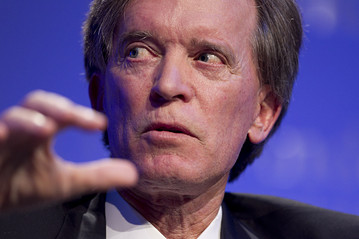 Bill Gross has warned that his
former employer’s liquidity management strategies are “counterintuitive” and
prove high risk in the event of a major market shock.
Bill Gross has warned that his
former employer’s liquidity management strategies are “counterintuitive” and
prove high risk in the event of a major market shock.
In his latest outlook letter to Janus’ investors, the former bond king named PIMCO—the company he left suddenly last year—among the providers of mutual funds, hedge funds, and exchange-traded funds that make up the “shadow banking system”.
“Long used to the inevitability of capital gains, investors and markets have not been tested during a stretch of time when prices go down and policymakers’ hands are tied to perform their historical function of buyer of last resort,” Gross wrote. “It’s then that liquidity will be tested.”
According to Gross, the Dodd-Frank law transferred systemic risk from investment banks to this “shadow-banking system” following the financial crisis, as banks were required to de-risk their balance sheets.
Certain market conditions—such as a fall in bond prices, Greece’s potential default, emerging market crisis, and geopolitical risks—could precipitate a “run on the shadow banks,” Gross continued.
“Since they in effect now are the market, a rush for liquidity on the part of the investing public, whether they be individuals in 401(k)s or institutional pension funds and insurance companies, would find the ‘market’ selling to itself with the Federal Reserve severely limited in its ability to provide assistance,” he added.
Earlier this month, PIMCO’s CEO Douglas Hodge wrote to the Financial Stability Board that outflows from funds do not pose a systemic risk to the financial system.
In addition, the Newport Beach, California-based bond shop said it has successfully managed more than $50 billion in redemptions from the Total Return Fund after Gross’ exit last year, without any “fire sales” or “forced selling.”
Instead, PIMCO said it was able to support cash buffers and inflows using derivatives for exposures.
Calling such practice “counterintuitive,” Gross emphasized that derivatives often represent increased leverage and risk, “presenting possible exit and liquidity problems in future months and years.”
ETFs and mutual funds also do not have built-in “gates” preventing an overnight exit if liquidity dries out, he continued.
“That an ETF can satisfy redemption with underlying bonds or shares only raises the nightmare possibility of a disillusioned and uninformed public throwing in the towel once again after they receive thousands of individual odd lot pieces under such circumstances,” Gross warned.
Despite criticizing PIMCO’s redemption management, Gross told Bloomberg he checks his old firm’s bond funds daily to see how he’s measuring up at Janus.
“I have a happy night if I’m doing better and a not-so-happy night if I’m not doing better,” he said.
Related: PIMCO: Outflows Do Not Pose Systemic Risk & Gross Calls Bund Short ‘Well Timed, Not Well Executed’
